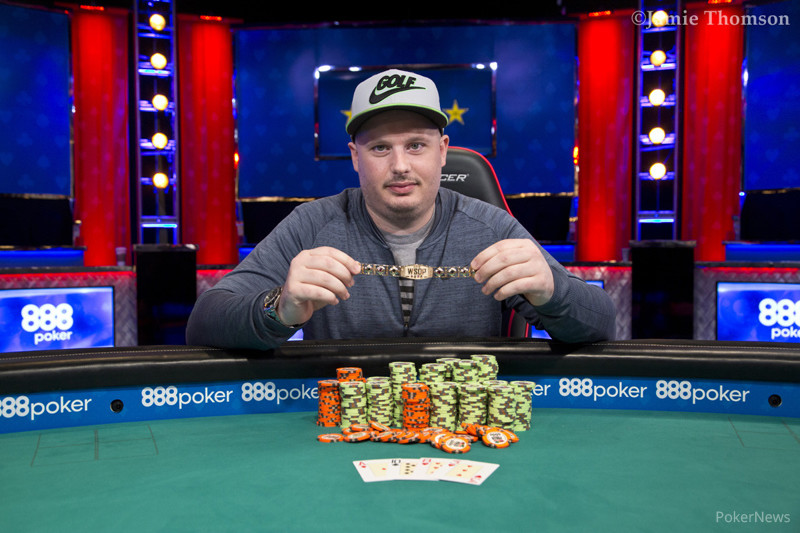Lo Poker Player
There are several actions in poker called declaration, in which a player formally expresses his intent to take some action (which he may perform at a later point).For example, one may verbally declare an action (fold, call, raise) while in turn, which obligates the player to complete that action.One may declare a number of cards to draw in a draw poker game (which is typically not binding), or one may declare some other choice specific to the variant being played.
- Is Omaha Hi Lo Profitable?Yes Omaha Hi Lo Can Be Profitable, Especially With Starting Hands Like: A-A-2-x / A-A-3-x / A-A-4-5 / A-2-3-x / A-2-K-K / A-2-Q-Q / A-2-J-J A-3...
- Poker News, Online Poker Reviews & Bonus Offers
- Cached
- TEXAS HOLD'EM POKER SEXIEST POKER PLAYERS WSOP - YouTube
- How To Play Omaha 8-or-Better Poker - The Official Rules ...
About Press Copyright Contact us Creators Advertise Developers Terms Privacy Policy & Safety How YouTube works Test new features Press Copyright Contact us Creators. August 11, 2020 at 9:44 AM. By Steve Ruddock. Poker writer Ken Lo’s work has appeared in PokerNews.com, and he runs his personal website, MixedGames.net. But his lasting contribution to the game of poker (at least up to this point) is the 691 page treatise on mixed game poker strategies he penned back in 2014: A Poker Player’s Guide to Mixed Games: Core Strategies for HORSE, Eight-Game. Play For Something. Make money playing video games on Players' Lounge. Madden, NBA 2K, Fortnite, Call of Duty, FIFA, & more!
But most commonly, the term refers to the declaration in the final phase of a high-low split game, in which players indicate whether their hands are to be evaluated as high hands, low hands, or both at showdown. This is only one option for high-low split games; the other is known as 'cards speak', in which players simply reveal their hands at showdown and award the pot to the highest and lowest hands shown (possibly subject to qualifications). Cards speak is used commonly in casinos because it is the much simpler method. High-low with declaration is common in home games.
Methods of declaration[edit]
There are several actions in poker called declaration, in which a player formally expresses his intent to take some action (which he may perform at a later point).For example, one may verbally declare an action (fold, call, raise) while in turn, which obligates the player to complete that action.

First, declarations can be made either in turn or simultaneously.
Games with verbal in-turn declarations (called 'last raise declares') are uncommon, because the positional value of declaring last is so great. Some think that makes the game unfair. Others see it merely as strategy, making the game more interesting, because players may alter their betting in the last rounds to get the position of declaring last or after a certain player. Also, if all the other remaining players declare one way, the last player to declare can then call the other way and take half the pot regardless of the actual rank of his hand.
Simultaneous declarations are commonly done by the 'chips in hand' method. Each player remaining in the game takes two chips or coins below the table, then brings up a closed hand containing zero, one, or two of the chips.After all players have brought their closed hands above the table, they all then open their hands to reveal their choices: for example, no chips in the hand means the player is declaring 'low', one chip 'high', and two chips 'swing' (both ways).
Some games then have another round of betting after the declaration, called 'bet/declare/bet', which clearly gives an advantage if there is just one person going a certain way.
Awarding the pot[edit]
After declaration and showdown, half of the pot is awarded to the highest hand among those players who declared high, and half to the lowest hand among those who declared low. If no one declared in one direction, the whole pot is awarded to the other (for example, if all players declared low, the lowest hand is awarded the whole pot).
If any player declared 'swing', then that player must have both the high and low hands to take any part of the pot, though there are several rule variations covering the specifics. First, if the rules specify that ties are acceptable, then a player declaring swing must win or tie both directions to win anything, but if he does, he is entitled to his appropriate share. For example, if the swing player has the clearly highest hand but shares the lowest hand with another player, he wins three-fourths of the pot and the other low hand wins one-fourth. If the rules specify that ties are not acceptable, then a swing player must clearly win both directions: even a tie in one direction means he wins nothing.
If a swing player fails for half the pot, the half that he would have otherwise won can be awarded either to the second-best hand in that direction, or to the player who defeated him in the other. The latter rule affords more strategic possibilities in declaration. For example, if a player declaring swing has the best high hand but loses for low (or ties for low with a no-ties rule), the whole pot is awarded to the low hand that defeated him.


A rule must be adopted for the case where no player is eligible to win the pot (for example, if all players declare swing, and no player winds both ways). Some possible rules include playing the hand as a no-declare hand, or having the pot ride over to the next hand.
Is Omaha Hi Lo Profitable?Yes Omaha Hi Lo Can Be Profitable, Especially With Starting Hands Like: A-A-2-x / A-A-3-x / A-A-4-5 / A-2-3-x / A-2-K-K / A-2-Q-Q / A-2-J-J A-3...

In traditional poker games, the player with the best traditional hand wins the whole pot. Lowball variations award the pot to the lowest hand, by any of several methods (see Low hand (poker)). High-low split games are those in which the pot is divided between the player with the best traditional hand (called the high hand) and the player with the low hand.[1]

There are two common methods for playing high-low split games, called declaration and cards speak. In a declaration game, each player declares (either verbally or using markers such as chips) whether he wishes to contest for the high hand or the low hand. The lowest hand among those who declared low wins that half of the pot, and the highest hand among those who declared high wins that half (for further details, see declaration). In a cards speak game, all players simply reveal their cards at showdown and the hands are evaluated by all players; high hand wins half of the pot and low hand wins the other half.
Especially when using the ace-to-five low method, it is possible for one player to have both the low hand and the high hand, and therefore win all of the pot (called 'scooping,' 'hogging' the pot, or 'going pig'). In the event more than one player ties for either high or low, the pot can be further split into quarters or smaller fractions. For example, if one player has the high hand on showdown, and two other players tie for the best low hand, the high hand wins half of the pot and each low hand wins only a quarter of the pot.
It is common, especially in cards speak games, to require a certain hand value or better to win the low half of the pot, called a qualifier. For example, in an 'eight or better to qualify low' game, a player with a hand of eight-high or lower is entitled to win the low half of the pot (assuming his hand defeats all other low hands), but a player with a 10-high or 9-high hand cannot win, even if his hand is the lowest. In this case, the high hand wins the entire pot. There is generally no qualifier to win high, although one common variant is any pair/no pair, where a hand of at least a pair is required to win high and any hand with no pair is required to win low.
Poker News, Online Poker Reviews & Bonus Offers
In high-low split games where each player is dealt more than five cards, each player chooses five of his cards to play as his high hand, and/or five of his cards to play as his low hand. The sets may overlap: for example, in seven-card stud played high-low split, a player dealt 7-7-6-4-4-3-2 can play a high hand of 7-7-4-4-6 (two pair, sevens and fours) and a low hand of 7-6-4-3-2 (seven-high).
Bluffs can be especially powerful in high-low split games, because a player making a successful bluff wins the whole pot rather than having to share it. This fact also makes bluffs less likely to succeed.
Cached
See also[edit]
TEXAS HOLD'EM POKER SEXIEST POKER PLAYERS WSOP - YouTube
References[edit]
How To Play Omaha 8-or-Better Poker - The Official Rules ...
- ^Zee, Ray (1992). High-Low-Split Poker, Seven-Card Stud and Omaha Eight-or-better for Advanced Players. Two Plus Two Pub.; 2nd edition, ISBN9781880685105[page needed]